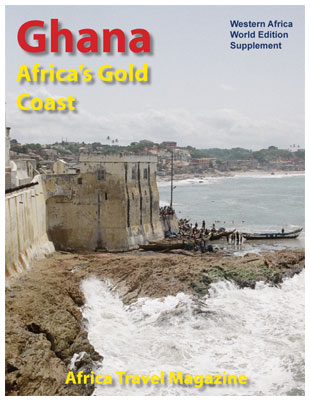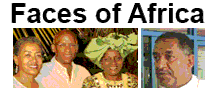
Item from Soutthern Africa World Edition - to be expanded
What is Panafest? Panafest is a cultural event dedicated to enhancement of
the ideals of Pan-Africanism and the development of the
African continent. It is organized biennially for Africans
and people of African descent as well as all persons
committed to the well being of Africans on the Continent and
in the Diaspora. It's goals are to establish the truth about
the history of Africa and the experiences of the African
people, using the vehicle of African arts and culture.
Panafest, by it's diverse character, projects a potential of
being the most prestigious and indeed the most relevant
cultural event on the African continent. More about
Panafest. Here is a typical Panafest Tour. Check for 2010
dates. PANAFEST and EMANCIPATION DAY "RE-EMERGENCE OF AFRICAN CIVILIZATION: RE-UNITING THE
AFRICAN FAMILY" 50 YEARS of GHANA'S INDEPENDENCE: "PAN-AFRICANISM
REVISITED - 21st CENTURY EDITION" OFFICIAL PROGRAMME Sunday * July 22 * " The Journey Begins" * Pilgrimage to the Northern
Sector "Retrace the Captured/Enslaved Ancestors route to
PANAFEST". Pilgrims arrive in Tamale Evening Reception Monday * July 23 * "The Pilgrimage" * Tamale &endash; Paga -
Navrongo Visit to Paga and Navrongo historical sites. Nania Camps. Navrongo gravesites. Evening in Tamale: Reflections Tuesday * July 24 * "The Pilgrimage" continues * Tamale
&endash;-Salaga Pilgrims visit Salaga and the famous "Enslaved Ancestors Market" Slave Market and Slave Camp History of Salaga by the Elders Evening in Bono Manso Wednesday * July 25 * "The Pilgrimage" continues * Bono Manso &endash;
Techiman &endash; Kumasi Visit historic sites of the ancient Bono Kingdom. . The Martin Luther King, Marcus Garvey and Malcom X memorial Parks Enslaved sites. Pilgrims depart from Bono Manso for Kumasi. Thursday * July 26 * "The Royal Return" *Kumasi - Assin Praso * Cape Coast /
Elmina Visit City of Kumasi, the Capital of the Asante
Kingdom. Visit Manhyia Asantehene's Palace. Learn the History of Asante Kingdom Depart Kumasi for Cape Coast/Elmina * "The Crossing and
the Arrival" Pouring of Libation at the "Crossing" of the River Prah at Assin Praso. Brief stopover at Assin Manso-the enslaved market. "Arrive" at Cape Coast/Elmina where the kidnapped/enslaved were stored and shipped away. Friday * July 27 * "The Return Journey" and Akwaaba Ceremony * Cape Coast -
Elmina Boat Ride from the Cape Coast Castle "Door of Return" to Elmina Castle/Dungeon. Reception by the Chief and Elders of Elmina in a traditional Akwaaba (Welcome) Ceremony. Saturday * July 28 * Grand Durbar & PANAFEST Official Opening Ceremony * Cape Coast Grand Procession of Chiefs, Traditional Rulers &
Queen Mothers, Eminent Personalities, Pan Africanists and artists in a royal display of pageantry. Sunday * July 29 * Opening of the "Pan African Conference " * Cape Coast
University Pan-African Scholars and Activist Conference Opening
Ceremony Monday * July 30 * "Pan African Conference" continues * Cape Coast
University African Scholars and Activist Conference on Pan
Africanism revisited / 21st Century Edition. Tuesday * July 31 * "Pan African Conference" * Evening Reverential Ceremony and Vigil Conclusion of the Pan African Conference at Cape Coast
University Reverential Evening: Candlelight vigil through the streets of Cape Coast to the Castle/Dungeon. Reverential Programme and Emancipation Day Midnite
tribute to the Ancestors. Mfantsipim Junction (Starting point for the vigil) to
Cape Coast Castle Wednesday * August 1 * Emancipation Day &endash;
Assin Manso Official Cerebration of Emancipation Day Programme. Grand Durbar of Regional Chiefs and Royals Wreath Laying and visit to the Sacred River to pour libation and spiritual bathing. Thursday * August 2 * "Healing Ceremony" and Open Day "In Memory of Those Who Have Gone Before Healing
Ceremony" Suggested Activities: Visit to Mankassim Posuban Shrine or Kakum National Forest. Friday * August 3 * Closing Gala and the "Joseph Awards" Cape Coast /
Elmina Gala Closing &endash; The Joseph Project: Ancient
Joseph's (Heroes & Heroines) International Artistic Performance at Elmina
Castles/Dungeons forecourt Saturday August 4 * Free Day or Transit Day to Accra Free Day to enjoy the Trade Fair Bazaar and/or
transit of foreign guests to Accra who have weekend departures. Compliments of Royal Derby Tours of Ghana/West Africa P.O.BOX KA16192 Airport-Accra., Ghana. Tel:(233) 244 949 225 www.royalderbytours.net *Operates in Ghana,Togo,Benin,Burkina Faso,Niger,Mali
& Cote D'Ivoire. Here are some examples of what is being said - in a
positive manner - about the Republic of Ghana, host country
of the ATA 31st International Congress in Accra, April 30 to
May 5, 2006 Ghana: 49 years of independence (editorial) Ghanaian Chronicle (Ghana) March 6, 2006 Since March 6, 1957, we as a people declared ourselves to
be a people with one nation, commonly sharing diverse
characteristics like religion, language, history, territory,
institutions, culture, statehood or aspiration to
statehood. The majority of the present generation was not involved
in the fight for freedom from the 'oppressor's rule.'
Indeed, at all times in the struggle of a people, it takes a
courageous few to be in the frontline - of course with a lot
more unsung heroes in the shadows. But a question that has received varied responses, as
many times as has been asked is, what we have done with our
independence. There are those who believe that we have not done enough
to justify the blood and toil of our fathers in redeeming
the land from oppressors' rule. There are others also who think that in spite of the
difficulties and incompetences demonstrated time and again
by our leaders, we are better off being short-changed by our
own kind than by total strangers. Even though those who had championed the struggle against
discrimination and unfair trade practices under colonial
rule had at times sacrificed their personal business
interests for the general good, as demonstrated by the likes
of Nii Kwabena Bonne II, Osu Alata Mantse and a businessman,
today, many public officials have been quick to sacrifice
the national interest for private and selfish interests. The leaders of our nation hardly make sacrifices. Yet
they have since independence called upon the people to
sacrifice, in anticipation of better days, without knowing
when their burden would be unloaded. Freedom and Justice, supposed to have been the foundation
of the nation, inscribed on our Coat of Arms and chiseled in
stone on our Independence Arch, remain illusive. Throughout our history, citizens who do not share the
political views (ideology) of the leadership were made to
feel they did not belong. There has been consistent demonstration of intimidation
and favouritism. There is the need to refrain from turning the celebration
of the independence into a partisan affair, since freedom
must be shared! Unfortunately, this is a lesson our leaders since
independence never seem to have learned. Our first
President, Dr. Kwame Nkrumah, in spite of his sterling
qualities and sense of vision for Ghana and Africa,
unequalled by any leader since, could not handle the freedom
won, nor build a foundation that would make all Ghanaians a
free people. The overthrow of his government and the First Republic,
and the subsequent flawed elections that ushered in the
Progress Party (PP) government of the Second Republic,
further continued and deepened the discrimination and
favouritism, perpetuating a divided state. The Third Republican government of the Peoples National
Party (PNP), coming in the wake of the bloody Armed Forces
Revolutionary Council (AFRC) coup, did not find its bearings
until it was overthrown in another coup on December 31,
1981. The longest republic that we have had is this one, which
started on a controversial note, following a boycott of its
first parliamentary elections in 1992 by political parties
opposed to the ruling Provisional National Defence Council
(PNDC) government's party, National Democratic Congress
(NDC) and its allies, after Flt. Lt. J. J. Rawlings had won,
what the opposition claimed was 'a rigged presidential
elections'. The electoral space for transparency and leverage has
seen tremendous progress, except that in the last few years,
certain hiccups experienced by the Electoral Commission has
not brought the best out of it. Ghana has journeyed far, but has generally made little
progress. The hopes of the people have been raised times
without number, only to be dashed. Citizens' trust in politicians continues to fall, and
what little semblance of it left has been achieved through
bribery and coercion.
 This
great event to be featured in Africa Travel Magazine's
Western Africa World Edition, Ghana Supplement
This
great event to be featured in Africa Travel Magazine's
Western Africa World Edition, Ghana Supplement
